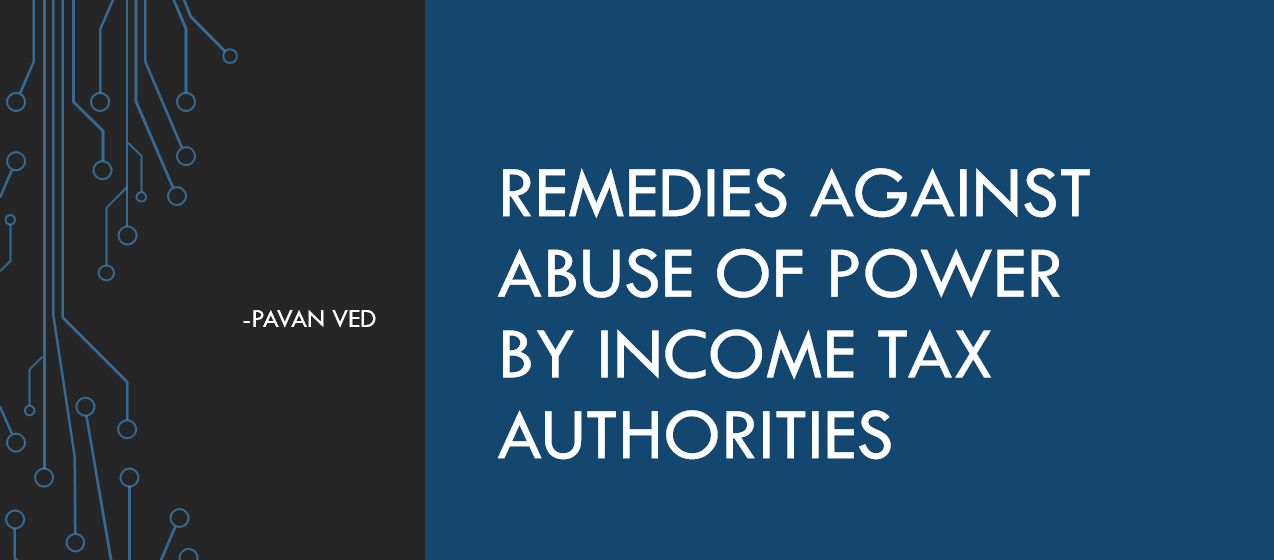Remedies Against Abuse of Power By Income Tax Authorities
Remedies Against Abuse of Power By Income Tax Authorities
Discretion Meaning
• All statutory authorities have been vested with discretion in order to carry out the functions assigned to them under the Act. This discretion has to be exercised reasonably and for the purpose for which they have been conferred.
• The discretion is not to be exercised arbitrarily and capriciously and must be backed by cogent reasons based on objective materials.
Abuse of Power
• A wrongful exercise of discretionary power can be categorized as an “Abuse of power” by the authority. This abuse of power can broadly be classified into the following types:
A) exercising the jurisdiction where there is none
B) refusing to exercise the jurisdiction in the place and manner where it ought to have been exercised.
C) Violation of the principles of natural justice
D) Exercise of the power in a wrongful manner.
• Broadly speaking, in cases A, B, and C above apart from the remedies of regular appeal, the assessee can challenge the action of the authorities in writ petitions before the High Court.
• In case D above, apart from challenging the merits of the decision made by the authority in regular appeal, the assessee can seek to make complaints regarding the conduct of the officer where the conduct is driven by personal vendetta or malice. The complaints can be made to Superior authorities/Vigilance department/criminal complaints under IPC as the case may be. It is however to be borne in mind that these complaints by themselves will not be redressal for the wrongful order made by the officer. The order being a judicial/quasi-judicial order will have to be set aside in appropriate proceedings which will have to be separately initiated by the assessee inappropriate appellate fora.
Instances of Abuse of Power at The Level of Assessment And Appeal
Most often than not we find that the assessing officers do not exercise the discretion vested in them in a rational and objective manner i.e. by taking a view which a reasonable person would take in the circumstances. This can result in high pitched assessments because the assessing officer has wrongfully/wilfully
• Ignoredbinding decisions/instructions/circulars cited before him
• Failed to give the benefit of the decisions/circulars in his knowledge particularly those in favour of the assessee which are applicable to the facts of the case
• Failed to consider the replies and arguments submitted by the assessee and meeting them with requisite reasons.
• Failed to record the inquiry results which are in favour of the assessee or could give benefit to him.
• Distinguished decisions of higher courts on frivolous and untenable grounds
• Placed the onus of proof on the assessee when in fact it lies on the department.
• Denied proper opportunity of hearing to the assessee or failed to confront the assessee with the material gathered behind his back thereby violating the principles of natural justice.
• It is settled law that refusing to exercise the power where it ought to be exercised is also an abuse of power. Some examples of culpable ommissions are:
1. Not deciding stay petition
2. Making recovery of whole or part of demand without deciding stay petition by Assessing Officer or by CIT (A) or by PCIT.
3. Levying penalty even before appeal decisions because facts would become final after appeal.
4. Withholding refund without any reason or with frivolous reason particularly when the amounts are large.
5. Not giving appeal effect in time and withholding refund.
6. Not releasing seized material in time.
7. Retaining seized materials/assets not used in the assessment
8. Browbeating the assessee to give in to unnecessary demands by threatening to issue notices under 147 or attachment of bank accounts or threatening with the prosecution.
Read & Download the full Copy in pdf:
If you already have a premium membership, Sign In.














